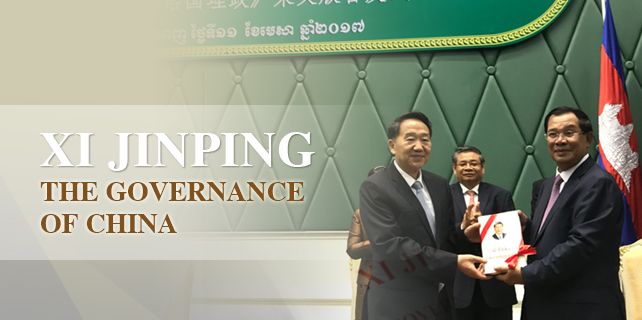IMF head warns of protectionism
The chief of the International Monetary Fund warned of protectionism and praised China ahead of the IMF/World Bank annual spring meeting in Washington next week.
"We are at a moment where the global economy needs both – a foundation of sound domestic policies combined with a steadfast commitment to international cooperation," IMF Managing Director Christine Lagarde said on Wednesday at Bruegel, an economic think tank based in Belgium.
She described the world economy as "gaining momentum as a cyclical recovery holds out the promise of more jobs, higher incomes, and greater prosperity going forward".
"But just as we see this momentum unfolding, we also see – at least in some advanced economies – doubts about the benefits of economic integration, about the very 'architecture' that has underpinned the world economy for more than seven decades," she said, clearly referring to the sentiment in the Brexit, the ongoing French presidential election as well as the rhetoric and policy of US President Donald Trump.
Lagarde believes that the finance ministers and central bankers from the 189 IMF member countries meeting on April 21-23 will have these questions in mind.
IMF's World Economic Outlook to be released before the meeting will show that the outlook for advanced economies has improved with stronger manufacturing activity.
Meanwhile, the emerging and developing economies have driven the global recovery in recent years, and they will continue to contribute more than three-quarters of global GDP growth in 2017, with China remaining the main engine.
Lagarde cited China as a success story, saying that "we estimate that China's integration into the global trading system accounted for as much as 10 percent of the average overall productivity increase in advanced economies between the mid-1990s and mid-2000s".
"Enormous gains like that translate over time into higher living standards. Today, billions of people enjoy longer, healthier, and more prosperous lives, largely because of our ability to harness the power of trade and productivity," she said.
Lagarde warned of some downside risks: political uncertainty, including in Europe; the sword of protectionism hanging over global trade; and tighter global financial conditions that could trigger disruptive capital outflows from emerging and developing economies.
She called on the world to build on policies that have delivered so much for the world. "And at the same time, we must avoid policy missteps – or as I have described them, 'self-inflicted wounds'," she said.
Lagarde noted the negative side effects of technology and trade, from job losses in some sectors to social challenges in those communities. She said there is no magic formula and urged greater emphasis on retraining and vocational training, job search assistance, and relocation support. She also suggested that the US could focus more on well-designed assistance for job search and job matching.
Lagarde said restricting trade would be a "self-inflicted wound" that disrupts supply chains, hurts global output, and inflates the prices of production materials and consumer goods. And low-income households are hurt the most as they consume the largest part of their incomes.
US President Donald Trump's negative attitude toward multilateral trade agreements such as the Trans-Pacific Partnership, the North America Free Trade Agreement (NAFTA) and the World Trade Organization and his proposal for a border adjustment tax has caused widespread concern about growing protectionism in the US.
Trump's attitude is regarded a sharp contrast to the vocal support for globalization voiced by Chinese President Xi Jinping in Davos, Switzerland, in January.
In his latest book, Failure to Adjust: How Americans Got Left Behind in the Global Economy, Edward Alden, a senior fellow at the Council on Foreign Relations, argues that the US has contributed more than any other nation to writing the global rules and helping support global growth. "Yet successive US administrations have done far too little to help Americans succeed under those rules," he writes.
chenweihua@chinadailyusa.com









